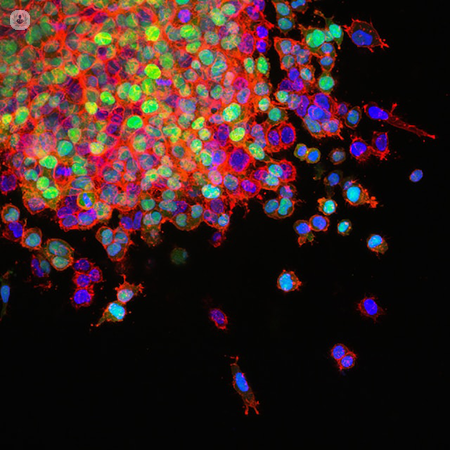A comprehensive guide to immunotherapy for breast cancer: part 1
Escrito por:In the first article of a two-part series, leading consultant medical oncologist Dr Mark Tuthill discusses immunotherapy for breast cancer, including how it works, and potential side effects.

How does immunotherapy work in treating breast cancer?
Immunotherapy works in treating breast cancer by essentially stimulating your own immune system to attack the breast cancer cells. The most common way this is done is by giving patients an infusion of monoclonal antibody. These therapies allow the immune system to attack breast cancer cells when they wouldn't otherwise have done so.
Immunotherapy involves targeted treatment of breast cancer cells using antibodies. Examples of immunotherapy treatments include Hoseptin and Patuzumab, which directly target breast cancer cells with antibodies. An alternative strategy is observed in Tuzumab-Dirux-Otikan, wherein an antibody is merged with chemotherapy to form a combination that transports both the immune system's antibody and chemotherapy directly to the tumour.
Checkpoint inhibitor therapy, such as Pembrolizumab, is employed in early triple-negative breast cancer. Additionally, advanced triple-negative breast cancer can be treated with immunotherapies like Atezolizumab and Pembrolizumab. These immune checkpoint inhibitors bind to proteins associated with immune cells, prompting the immune system to attack and eliminate breast cancer cells.
What are the potential side effects of immunotherapy for breast cancer?
Immunotherapy has several potential side effects. However, the most common of these are:
- Itching.
- Rash.
- Joint aches and pains.
- Diarrhoea.
One notable aspect of immunotherapy is its impact on the entire immune system, potentially causing inflammation anywhere in the body. It's crucial to recognise that this inflammation can be severe, leading to the discontinuation of immunotherapy in approximately one out of ten patients due to significant side effects. Despite this, the overall tolerance of immunotherapy is considerably high when compared to treatments like chemotherapy.
While there are specific serious side effects, such as inflammation in the heart or lungs, these occurrences are exceptionally rare. The most common side effects, like itching or rash, are typically addressed with steroids. Long-term monitoring may be necessary for other effects, such as alterations in hormone receptors or hormone production, such as thyroid hormone. Immunotherapy has accumulated substantial experience over the past 15 years in treating both early and advanced breast cancer, as well as various other cancer types.
Initially, when immunotherapy was introduced, many of these side effects were unknown, and managing them required a learning process. However, with the accumulated knowledge, these side effects can now be addressed and detected more easily. While not devoid of side effects, the majority of them can be effectively treated and managed as part of routine clinical practice.
Is immunotherapy a standard treatment option for all breast cancer patients?
Immunotherapy has been a longstanding component in the treatment of certain types of breast cancers, specifically addressing HER2-positive breast cancer. Aseptin treatment, targeting the HER2 protein, also incorporates an immunotherapy aspect, along with various related treatments. For early-diagnosed triple-negative breast cancer, a significant number of patients with tumours exceeding two centimetres, whether or not lymph nodes are involved, now undergo a combined immunotherapy and chemotherapy regimen in the early stages of breast cancer treatment, as it is linked to improved outcomes.
In advanced triple-negative breast cancer, the presence of immune activation indicators becomes crucial. However, in hormone receptor-positive breast cancer in advanced stages, the role of immunotherapy hasn't been firmly established. However, there have been two recent studies, one involving pembrolizumab and the other one involving nivolumab, in which immunotherapy was combined with chemotherapy for early breast cancer a higher proportion of patients had complete disappearance of their breast cancer after chemotherapy given before surgery.
These near-adjuvant treatments (chemotherapy with immunotherapy) before surgery have yet to find an approved place in terms of the management of early breast cancer. However, it is likely that immunotherapy will be part of all breast cancer treatments however, currently, immunotherapy use for breast cancer is restricted to her two positive breast cancer and triple-negative breast cancer in the clinic.
To book a consultation with Dr Tuthill, simply visit his Top Doctors profile today


